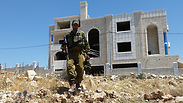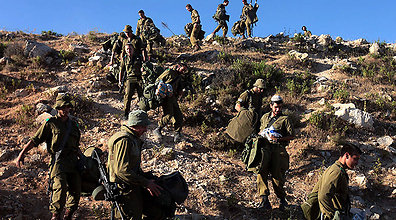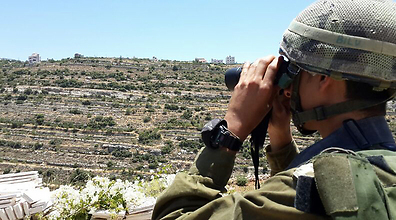So it was no surprise to hear him say the following on Wednesday, to new IDF officers: "Remember that the citizens of Israel expect us to do the job, and trust us to bring the boys back home - all of the boys - safe and sound."
This seemingly innocent sentence, that places "getting the job done" alongside "bringing the boys home," is surprising when coming from the chief of staff. Primarily, because it legitimizes unrealistic expectations of the IDF, expectations that have already become widespread among the general Israeli public, and harm the IDF's ability to deal with crises. Secondly, this sentence also implicitly sets a requirement to IDF commanders at all ranks that, if executed, would lead to catastrophic consequences in the next conflict.
Related stories:
- Mothers of kidnapped boys: World is indifferent to abduction
- Israel names two prime suspects in teens' abduction
- Obama to Peres: 'Our hearts are with kidnapped boys'
Anyone who ever fought in the army knows that a mission under fire - even if the commanders and soldiers are level-headed and well experienced - entails, for the most part, casualties and injuries among our troops. Fortunately, not all combat missions are supposed to be, or are done, under fire. This has been the case recently, when good intelligence, threat assessment, planning and backup minimize the dangers our troops face both in routine security missions and in clandestine missions to foil or disrupt enemy attacks. But even at a time like this, routine missions that pose low risk to soldiers often end, unfortunately, with losses on our side. Mostly, this happens due to reasons that neither the commanders nor the soldiers have any control over, at times because of human error or negligence.
Fight first
The battle field is the kingdom of uncertainty, where most of the decisions are made in a fraction of a second, which makes these decisions prone to error.This is why all western armies, and almost all theoreticians dealing with the military experience, decided that completing the mission comes before protecting soldiers from harm. Why? Because when a commander or a soldier decide that bringing the "boys" (IDF soldiers) home is more important than getting the job done, they just get up and run away from the battle field. A recent example of that can be found in Iraq, where the army is abandoning its posts amid the jihadist attacks of ISIS. The result of this is disastrous defeat for both the civilian population and the military. The State of Israel, for obvious reasons, cannot afford this luxury.
This is why the IDF's code of ethics, which sets out the manner in which commanders and soldiers must act and conduct themselves, makes clear reference to this issue. The principle of "Perseverance in Mission and Dedication to the Pursuit of Victory" is the first of the 10 principles listed. Furthermore, the authors of this ethical code stress that this principle has precedence over the others. "Human Life" is only the fifth principle.
And this is what the IDF code of ethics says: "The IDF serviceman will fight and conduct himself with courage in the face of all dangers and obstacles; he will persevere in his mission courageously, resolutely and thoughtfully even to the point of endangering his own life."
Does this mean an IDF soldier must always "endanger his own life" in order to complete the mission? Absolutely not! Military practice is familiar with quite a few military and combat missions in which the commander or even the political leadership decided ahead of time that the troops could withdraw without completing the mission if our soldiers faced a life threatening situation, or even if innocent civilians in enemy territory we in mortal peril.
Hysterical reaction to wounded soldiers
Gantz is a commander/fighter who knows these truths well. But his words at the IDF's officers training base, which seemingly contradict the IDF code, were not a coincidental slip of the tongue. Placing the value of keeping the soldiers from harm on the same level as getting the job done is a reflection of a faulty outlook that's been common among the Israeli public and the IDF for years now. A lot has been written on the reasons, as well as psychological and social explanations, for this harmful perception that prefers "the children's safety at any cost" to the national existential interest of all of the state's citizens.
This is a result of a society that is weary of wars, which once again no longer feels as threatened as it did before, and therefore is no longer willing to sacrifice those it holds dearest as it did before. This comes from the lack of faith on a part of the public in the justification for ruling millions of Palestinians in the West Bank with force, and it might be the outcome of our longing to finally become a civic society in which each individual can realize his own aspirations without having to worry about society as whole.
In any case, this is a fairly new phenomenon, one which started at the end of the 1990s. The clearest expression of this phenomenon was the 2006 Second Lebanon War, during which the Israeli public accepted destruction and loss of lives with relative restraint, but reacted with hysteria to reports of the losses of "children" (the IDF soldiers) who went to Lebanon to stop the rocket fire on the North.
It wasn't just the civilian population that was acting strangely during that war. Golani and paratrooper soldiers, as well as the IDF's senior command, focused mostly on evacuating the wounded and saving them rather than on fighting the enemy and completing their missions.
It is true that the IDF's top brass failed to clearly define the missions at hand, or didn't define them at all, which in some way clears the fighters and commanders on the field of blame. But they mustn't ignore the IDF rule determined long before that in war priority must be given to fighting the enemy, and only once that is done will there be time to treat the wounded.
Heavy price for Shalit
This rule was broken during the Second Lebanon War. Too many focused with vigor on evacuating the wounded to the sound of cheers and applause from the civilian population, and forgot to fight. As a result of the lack of a determined ground offensive dedicated to the pursuit of victory, we suffered additional unnecessary losses.
What's worse is that due to the fear of losses and of the public's reaction, the decision-making process of the political echelon was completely thrown. The political leadership battled doubts, went back and forth on its decisions, and needlessly prolonged the fighting.
Only the impressive offensive by the Air Force at the beginning of that war managed to salvage the situation and turned the fiasco into strong deterrence that lasts until this very day.
This twisted obsession with "the safety of our boys" has led the State of Israel to sign unrealistic prisoner swap deals. Like the outrageous deal that was signed with Hezbollah after the Second Lebanon War in which we freed living terrorists and several terrorists' bodies in return for the right to bring the bodies of Staff Sgts. Ehud Goldwasser and EldadRegev for burial in Israel.
But the worst deal was of course the GiladShalit deal, in which public/PR pressure on the government resulted in bringing home a captive soldier at an exaggerated cost. This has led in recent years to dozens of kidnapping plots that have fortunately been thwarted, but also to the one abduction that succeeded and turned into a strategic terrorist attack.
Bringing back "our child" GiladShalit claimed, and still does, a heavy price. I'm already concerned about what will happen when the situation of the kidnapped teens becomes clear.
The pointless journey of the teens' mothers to plead with the UN Human Rights Council in Geneva for help, as well as the blunt statements one of the mothers made at the Knesset, do not bode well for the future.
This is why it worries me to hear the chief of staff giving legitimization, through his own words, to the new public norm, and recommending that the young officers give equal importance to "completing the mission" and ensuring "the safe return of the boys."
This norm of behavior could cost us dearly, whether the politicians sitting in the Israeli government demand to negotiate for the kidnapped teens or their bodies, or the next time the IDF is forced to go to war or on a limited offensive.



















